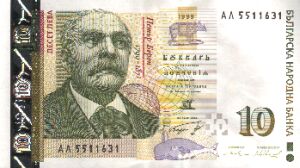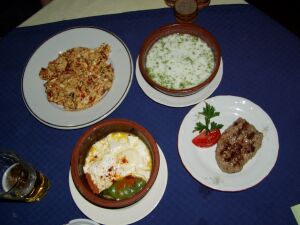Prologue
Many people associate the country with the Black Sea coast and tourist ghettos lining up along the seashore. Which is really a pity - there's so much to discover in the country. Like a lot of culture, much history, stunning landscapes, good food and so on. Sure the beaches are nice, but the real jewels of Bulgaria can only be found in the hinterland.
Visa
Most nationalities do not require a visa any longer - travelers from the EU, Canada, USA, Australia, UK, Japan etc can stay one month (some even 3 months) in the country with nothing more than a valid passport. Border controls have eased considerably as well - corruption at crossing points seems to have vanished. Welcome to Europe, Bulgaria!
Yes or No!?
- Tabibito aka ignorant traveler: Two tickets to Burgas, please.
- assistant: To Burgas?
- tabibito: (is nodding)
- assistant: What!? Didn't you say Burgas?
- tabibito: Sure I did! (and is nodding again)
- assistant: (is looking a bit annoyed now) So where do you want to go now?
- tabibito: Burgas!!! (looking serious now, trying hard not to move his head)
- assistant: Got that. That was two tickets, right?
- tabibito: (is nodding again...)
- assistant: ...
And so on and so forth. It's hard to get rid of this habit (and definitely confusing when you come back from Bulgaria), so it's the best thing to try not to move one's head at all.
Money
The Bulgarian currency is called Lev (Plural: Leva), with 1 Lev consisting of 100 Stotinki. The exchange rate was tied to the Deutschmark, ie Euro today. In 1999, the devaluated old money was substituted by the new Leva, with 1 Lev = 1 Deutschmark. This means that the exchange rate today is € 1 = 1.95 Lev. Denominations are as followed: There are 1, 2, 4, 10, 20, 50 Stotinki and 1 Lev coins and 1, 2, 5, 10, 20, 50, 100 Leva bills. Money issued before 1999 is not valid any longer and can't be exchanged.
There are plenty of ATM in bigger cities, accepting most credit cards as well as Maestro and Cirrus bank cards (for the latter, the usual fee per transaction is € 4). Attention: Although the currency is quite stable, it's virtually impossible to exchange Bulgarian money outside the country. Even in neighbouring Macedonia it's hard to find an exchange booth accepting Leva, and the rate is rather poor. Stay away from exchange booths at border crossings - the rate is very bad. Check the rates of several exchange booths beforehand!

| ||
| Bulgarian 10 Leva bill |
Costs
Bulgaria is still one of the cheapest destinations in the area. Accommodation in simple but mostly clean hotels or pensions rarely costs more than € 10 per person in a double room. Private accommodation (often offered by older ladies at bus stations) can be as cheap as € 2 per night. Eating out in restaurants is extremely cheap. The same can be said about train and busrides. The amazing thing about it is the quality. If you think that dinner for € 2 and an espresso for € 0.20 is going to be of rather poor quality, you will soon find out that it's wrong. I have no idea how Bulgarians manage to sell things that cheap, but somehow they do. It goes without saying that prices at the seashore are substantially higher (but still cheap).
Getting there
Bus, train, plane, car - you name it. By now, many nationalities do not need a visa any longer for all the neighbouring countries. There are many direct flights from European capitals to →Sofia and →Plovdiv as well as countless charter flights to →Burgas and →Varna at the Black Sea - of course not in winter. Booking a package tour, flying there, throwing away the vouchers and exploring the country on your own can sometimes be cheaper than booking a regular flight.
The national carrier is called Balkan Airlines, and it's good for travelers seeking extra thrill. Their slogan is "wings of challenge", and indeed it is a challenge. Once, I was having a seat next to the wing. During our landing in Burgas, the plane suddenly started to wobble, and the wing almost touched the ground - it was a few inches left only. Even today I'm wondering why I don't have phobia about flying since then. Additionally I should mention that I had four flights with Balkan Airlines - and four delays. Of course, this might have improved.
Many long-distance buses run from several destinations in Europe to Bulgaria. However, spending more than 24 hours on the bus and passing several border crossings is not everyone's cup of tea. Still, buses are the easiest way to get there (except hitchhiking of course).
Some international trains connect Bulgaria with the rest of the world. In summer, a direct train from →Prague runs all the way to →Varna - which takes more than 36 hours. Another option are trains from Germany or Austria etc to →Zagreb and from there via →Belgrade to →Sofia. Additionally, there are direct trains to Thessaloniki in Greece, to →Istanbul, Moscow, →Kyiv (Kiev) and so on. Note that there is no train connection with neighbouring →Macedonia due to a lack of tracks.
When coming from Middle Europe, it's also possible to go by car, from the →Czech Republic or Austria via →→Slovakia and →Hungary or →Yugoslavia or Serbia resp.
Border crossings
Some remarks on border crossings I have used on my trips to and from Bulgaria:
- Burgas Int'l airport: Probably the easiest and most hassle-free way to enter the country.
- Giurgiu (Romania) - Ruse: Here, the wide Danube river marks the border, with a long steel bridge linking the countries. It's very difficult to reach the border crossing from Rumania without your own vehicle, but there are some trains crossing the border. It's possible to cross the border with a bicycle or on foot. Entry procedures take a few minutes only. From the Bulgarian side, a regular bus takes you to the centre of →Ruse, which is around 8 km away. The fare is 0.4 leva only.
- Kulata (to Greece), road from Thessaloniki to Sofia: In 1996, it was not possible to cross the border here in your own car without bribing the officials. I guess this information is not valid any longer. This busy crossing is good for cars, buses and trains.
- Gjueshevo (to Macedonia), road from Sofia to Skopje: Crossing this point is quite a hassle and treatment can be called a harassment. Leaving the bus, lining up in front of all your luggage, long examinations on both sides - but they are not interested at all in foreigners. Still, it's time-consuming. (as of 2003).
The busride from Sofia to Skopje costs 20 Leva (€ 10) per person, the ride takes around 5½ hours.
- Malko Tarnovo - Kirklareli (Turkey): A funny, deserted border crossing this is. Note that there's no public transport at all on both sides, so you will have to hitchhike (at least I had to - without any problems). The road leads through the Strandsha Mountain Range: Just for the sake of the marvellous landscape it's worth crossing the border here. Border procedures can take a while and there's a health control on the Turkish side. Once they let me wait for over an hour in no man's land after taking my passport - because the Bulgarians had lunchbreak as I found out afterwards.
Transportation in Bulgaria
There are some train connections, but most trains are very slow. Today, buses are much faster and more convenient. There are countless long-distance and short-distance buses, and as with the long-distance buses, most of them are fast and modern. And very cheap. Taxis are everywhere (except that you desperately need one), but some drivers can be really annoying.
Food and drinks
The Bulgarian cuisine is definitely worth mentioning. When asking a Japanese, what he would associate with "Bulgaria", around 99% will answer "Yoghurt". There's a good reason for that: The scientific name for the yoghurt culture is called lactobacillus bulgaricus.

| ||
| Traditional Bulgarian dishes |
Many traditional dishes are based on plain, slightly sour yoghurt. Among them is the famous Tarator, a cold yoghurt soup with cucumber and herbs (see picture, top left). Another highly important ingredient is the omnipresent sheep's milk cheese (Sirene): This salty white cheese can be found on the top of salads (shopska salata), on gratins, pasta and even on chips (French fries). Why not. My personal favourite and another good reason for traveling Bulgaria again and again is a dish called Sirene po shopski, which is some sort of casserole, containing sheep's milk cheese (therefore the name), paprika, egg, tomato and many spices and herbs (see picture bottom left). Bulgarian cuisine is heavily influenced by the neighbouring countries: meatballs (Köfte) as well as fried meat (Kebabce, see picture bottom right) are from the Ottoman area, minced meat-eggplant-casseroles (moussaka) belong to the Greek staple diet. Not to forget a dish called mishmash, literally "hotchpotch". "What's for dinner tonight, darling?"..."Hotchpotch, my dear!". However, this is exactly what it is (see picture top left). It's chopped tomatos and, you name it, sheep's milk cheese and more - boiled. It looks strange (but still better than porridge), but it tastes good.
Bulgaria is famous for its wine. Unfortunately, they mostly export undrinkable wines like the infamous Rosentaler Kadarka etc. The Bulgarians are probably clever: They keep the good stuff for themselves and dump the rest at foreign countries. It's worth trying a Bulgarian wine here and there in the country itself. Of course, beer is quite popular as well. Zagorka is one of a handful of fine beer sorts. The typical Balkan fire water can be found in Bulgaria, too: Slivova and other Rakiya (fruit brandy), Mastika (aniseed based brandy, similar to the Greek ouzo or the Turkish rakı) etc are highly common. All sorts of alcohol - as long as they are produced in Bulgaria - are incredibly cheap. By the way, a small brandy or vodka etc means 5 cl in Bulgaria!
©2024 Europe-East.com

 Albania
Albania Bulgaria
Bulgaria